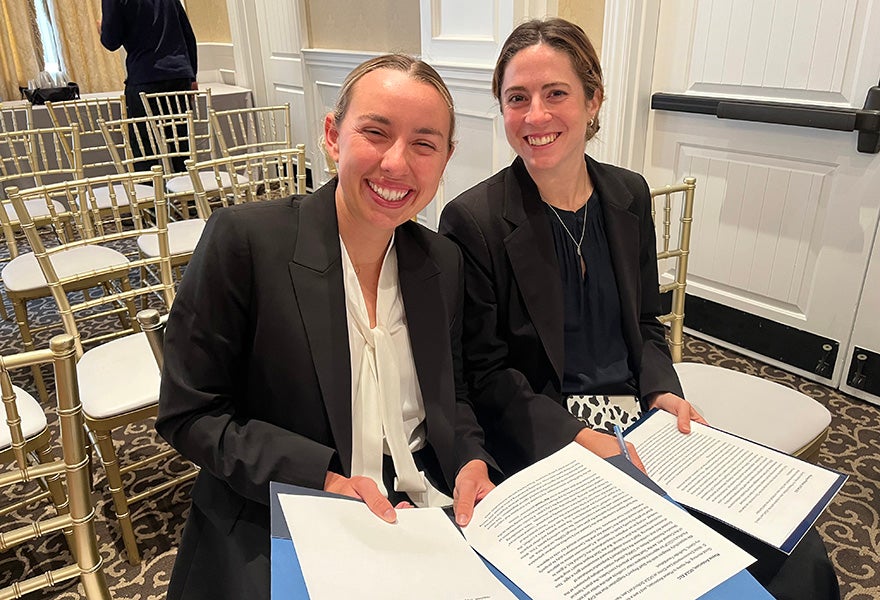How UCLA Law’s environmental clinics help students make a difference across California

The hall was standing room only when Maeve Anderson ’26 and Ana Mackay Peltzer ’26 stepped up to the microphone to speak. And this was no drill. The UCLA School of Law students were at a May 2025 hearing in Half Moon Bay to testify on a precedent-setting matter before the California Coastal Commission. The city of Pacifica’s land use proposal included seawalls, which deplete California’s beaches. State law, Peltzer told the commissioners, “simply does not allow for the city to kick the can down the road on protecting natural resources in favor of continued development.” Both 2Ls, Peltzer and Anderson were testifying on behalf of a real client, the Surfrider Foundation.
Many top law schools have an environmental law clinic, but UCLA Law has two. Housed in the law school’s renowned Emmett Institute on Climate Change and the Environment, the clinics give students two distinct opportunities to learn through hands-on experience. Students in the environmental law specialization often cite this clinical education as the highlight of their time at UCLA Law.
In the Frank G. Wells Environmental Law Clinic, students represent clients on pressing matters at the local, national, and international levels. Over the years, clinic students have provided analysis underscoring the legal basis for Los Angeles County to phase out oil and gas operations; drafted successful petitions to enforce air monitoring near oil refineries; successfully challenged the grant of a permit for coal mining on Native American lands in Arizona on behalf of Hopi tribal members; and worked through the United Nations for small island states fighting for aggressive international climate change action.

In the California Environmental Legislation and Policy Clinic, students work with Sacramento lawmakers to research problems, draft policy memos, and help write real legislation. One of the clinic’s recent successes happened last spring, when Maya Hernandez ’26 and Ian Bertrando ’26 testified as expert witnesses at the California Senate Environmental Quality Committee for a senate bill that they helped to draft. It targeted air pollution from aggregate facilities, which are businesses that process construction debris like concrete and asphalt, grinding them into fine sand and gravel for reuse as construction materials. When lawmakers put questions to the bill’s sponsor, they praised the students’ work. “I appreciate the UCLA Law students you’ve involved in this,” said Sen. Catherine Blakespear, the committee chair. “It’s a great community inclusion of our next generation’s brightest minds.” The bill cleared the committee and passed the state senate.
This year, Hernandez and Bertrando are serving as co-presidents of the law school’s Environmental Law Society, a lively community for specialization students who share information on internships, jobs, webinars, hikes, clubs, mentoring opportunities, and other developments in the industry.
These days, the field of environmental law is about more than just statutes and regulations. It also encompasses deal-making around energy and technology, as well as international diplomacy. UCLA Law students therefore benefit from a diverse slate of courses through which they can explore legal issues involving electric vehicles, public utilities, natural resources, and geoengineering, among other cutting-edge topics. Professors at the law school are experts in California and federal environmental policies, as well as authorities on China clean technology and international human rights law, which has increasing bearing on environmental considerations.
Alumni of the environmental law program have gone on to lead environmental non-profits, government agencies, private firm energy practices, and even international diplomatic teams. Veronika Bagi LL.M. ’23 now heads Hungary’s delegation and chairs the E.U. negotiating group to the UNFCCC, the United Nations body that deals with climate change. “It opened another window for me to widen my perspectives,” Bagi says about the impact that the environmental specialization has had on her career.
Divya Rao, a managing associate at Sidley Austin who focuses on energy finance and infrastructure, agrees: “The breadth and span of opportunities — ranging from lobbying and legislative work to regulatory work to litigation — really helped inform my decisions and where I wanted to go in my career.”
-
J.D Environmental Law
-
LL.M. Program